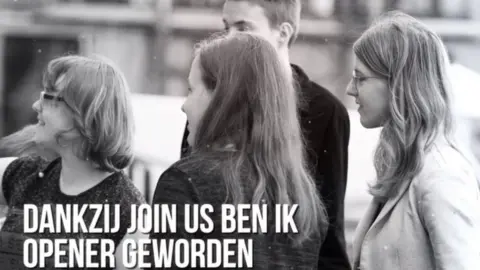Dutch woman's candid tweet that launched helpline for the lonely
 Join Us
Join UsNadï van de Watering, 25, was contemplating another day of amusing herself, enviously watching others her age enjoying summer parties in the glorious sunshine.
It was while waiting outside her physiotherapist's in the eastern Dutch city of Nijmegen that she decided to reach out on social media in the vague hope someone in a similar headspace might reply.
Her courage was rewarded with an avalanche of responses and the hashtag "maatjegezocht" was born. It translates as "seeking a pal".
There are no figures for the scale of social isolation in the Netherlands. Loneliness is a subject rarely discussed in a country often considered emotionally insular.
But her tweet has generated more than a million messages - an indication of how many other young Dutch people may be desperate to escape their solitude.
How the helpline began
Youth worker Jolanda van Gerwe spotted the likes and shares and vowed to build on the momentum Nadï van de Watering's tweet had generated.
Her group, Join Us, set up a hotline for people aged between 12 and 30.
Calls to the hotline will act as alerts and link young people looking for friends in the neighbourhood. The data will be used to highlight the scale of youth loneliness and petition councils to do more to assist young people in cultivating their social circles.
"We give lonely young people a place to be heard and put them in touch with youth clubs specialising in kids who are lonely," Ms Van Gerwe tells the BBC.
"But they need more than just a club, they need advice and guidance to escape their lonely lives. They need help in three ways - connections, social skills, and to stop having a negative bias about themselves and the world."
The idea has already attracted the support of the Dutch government, earning the praise of Public Health Minister Hugo de Jonge who encouraged people to use the hotline.
What is loneliness?
Up to 10% of young people are considered "chronically lonely", according to global statistics.
"Young people see loneliness as a taboo," says Gerine Lodder from Tilburg University, one of the few Dutch academics conducting scientific research into youth loneliness.
She cites a TV poll suggesting 60% of those who feel lonely say they will never talk about it.
Ms Van Gerwe, agrees: "A lot of Dutch people put a mask on every day and night.
"We confuse loneliness and isolation. It's not the same. Loneliness is a subjective feeling of not having enough or not having high enough quality of interactions.
"You can be lonely surrounded by others. There's an aching feeling: I should be able to connect now but I can't."
Dr Lodder believes the new hotline can help people realise they are not alone, as well as giving an indication of how many are struggling.
How young woman's tweet made a difference
It is not without irony that the catalyst for the loneliness hotline was a candid tweet. Social media is often suspected of exacerbating feelings of isolation among young people, and yet the reality is more nuanced.
It can act as a vital resource for LGBTQ or other minority groups who cannot find people like them in real life.
 Nadï van de Watering
Nadï van de Watering Join Us also hopes the loneliness hotline will help reduce physical ailments.
"Loneliness can affect more than emotional wellbeing," explains Jolanda Van Gerwe. She talks of insomnia and addiction to drugs and alcohol, and says the immune system can also be affected.
"Nadï's tweet showed it was normal to be lonely, she shook up the Netherlands, but it's just the tip of the iceberg, it's the start of a change, breaking down the taboo."

More stories about loneliness

What did it do for Nadï?
Nadï received 50,000 private messages in response to her tweet, some from people inviting her for a drink, others sharing their stories of loneliness and asking her advice.
"Yes! I've met a few friends. Two people that I can call friends. And so many sweet comments. I've had no friends for 25 years, my whole life, so every response is so nice!"
And her advice is to speak out: "Know you are not alone, report to the hotline and find help. Because it's serious, and you can find other people on social media."
She is proud that her seeking-a-pal hashtag became a trending topic, leading to new friendships and even, she says, two relationships.
The next stop for researcher Gerine Lodder is a study of loneliness. She wants to follow the daily lives of 300-500 high school students using Bluetooth.
"We'll send them multiple questions on their mobile phones about what they're doing, who they're with, how they're feeling," she explains.
Students will then wear Bluetooth beacons so she can monitor interaction between them.
That way she wants to find out how daily social processes lead to fluctuations in loneliness, and why some young people remain lonely whereas others do not.
